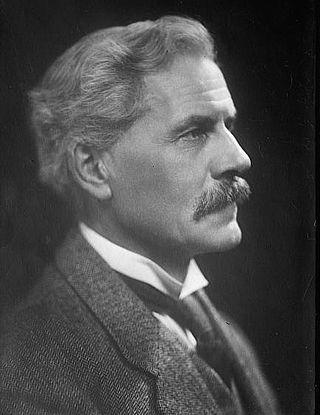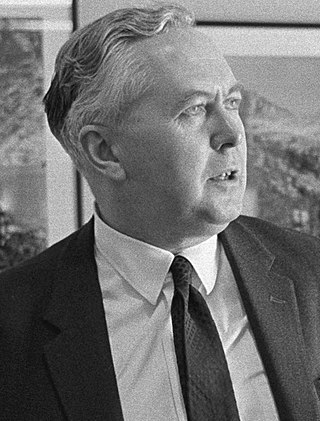
Johan Nygaardsvold was a Norwegian politician from the Labour Party who served as the 21st prime minister of Norway from 1935 to 1945. From June 1940 until May 1945, he oversaw the Norwegian Government-in-exile from London as head of the Nygaardsvold cabinet during the occupation of Norway by Nazi Germany.

National Insurance (NI) is a fundamental component of the welfare state in the United Kingdom. It acts as a form of social security, since payment of NI contributions establishes entitlement to certain state benefits for workers and their families.

The secretary of state for work and pensions, also referred to as the work and pensions secretary, is a secretary of state in the Government of the United Kingdom, with overall responsibility for the business of the Department for Work and Pensions. The incumbent is a member of the Cabinet of the United Kingdom.

The Department of Health and Social Security was a ministry of the British government in existence for twenty years from 1968 until 1988, and was headed by the Secretary of State for Social Services.

Sir Howard Kingsley Wood was a British Conservative politician. The son of a Wesleyan Methodist minister, he qualified as a solicitor, and successfully specialised in industrial insurance. He became a member of the London County Council and then a Member of Parliament.

The first MacDonald ministry of the United Kingdom lasted from January to November 1924. The Labour Party, under Ramsay MacDonald, had failed to win the general election of December 1923, with 191 seats, although the combined Opposition tally exceeded that of the Conservative government, creating a hung parliament. Stanley Baldwin remained in office until January 1924.

The second MacDonald ministry was formed by Ramsay MacDonald on his reappointment as prime minister of the United Kingdom by King George V on 5 June 1929. It was the second time the Labour Party had formed a government; the first MacDonald ministry held office in 1924.
The National Insurance number is a number used in the United Kingdom in the administration of the National Insurance or social security system. It is also used for some purposes in the UK tax system.

Clement Attlee was invited by King George VI to form the Attlee ministry in the United Kingdom in July 1945, succeeding Winston Churchill as Prime Minister of the United Kingdom. The Labour Party had won a landslide victory at the 1945 general election, and went on to enact policies of what became known as the post-war consensus, including the establishment of the welfare state and the nationalisation of 20 percent of the entire economy. The government's spell in office was marked by post-war austerity measures; the crushing of pro-independence and communist movements in Malaya; the grant of independence to India, Pakistan, Ceylon, and Burma; the engagement in the Cold War against Soviet Communism; and the creation of the country's National Health Service (NHS).
Social welfare, assistance for the ill or otherwise disabled and the old, has long been provided in Japan by both the government and private companies. Beginning in the 1920s, the Japanese government enacted a series of welfare programs, based mainly on European models, to provide medical care and financial support. During the post-war period, a comprehensive system of social security was gradually established. Universal health insurance and a pension system were established in 1960.

Harold Wilson was appointed Prime Minister of the United Kingdom by Queen Elizabeth II on 16 October 1964 and formed the first Wilson ministry, a Labour government, which held office with a thin majority between 1964 and 1966. In an attempt to gain a workable majority in the House of Commons, Wilson called a new election for 31 March 1966, after which he formed the second Wilson ministry, a government which held office for four years until 1970.

The Ministry of Pensions and National Insurance (MPNI) was a British government ministry responsible for the administration and delivery of welfare benefits. It was headed by the Minister of Pensions and National Insurance.

The Ministry of Finance is a Swedish government ministry responsible for matters relating to economic policy, the central government budget, taxes, banking, security and insurance, international economic work, central, regional and local government.

The Ministry of Labour was a British government department established by the New Ministries and Secretaries Act 1916. It later morphed into the Department of Employment. Most of its functions are now performed by the Department for Work and Pensions.

Benton Park View, located in Benton, a suburb of the City of Newcastle upon Tyne, United Kingdom, is a multi-agency site of the UK Government. The complex is one of the largest secure civilian government complexes in Europe. The site is owned by Newcastle Estates Partnership and the principal tenants are His Majesty's Revenue and Customs (HMRC) and the Department for Work and Pensions (DWP). The site consists of a large group of office blocks within a secure perimeter.
India has a robust social security legislative framework governing social security, encompassing multiple labour laws and regulations. These laws govern various aspects of social security, particularly focusing on the welfare of the workforce. The primary objective of these measures is to foster sound industrial relations, cultivate a high-quality work environment, ensure legislative compliance, and mitigate risks such as accidents and health concerns. Moreover, social security initiatives aim to safeguard against social risks such as retirement, maternity, healthcare and unemployment while tax-funded social assistance aims to reduce inequalities and poverty. The Directive Principles of State Policy, enshrined in Part IV of the Indian Constitution reflects that India is a welfare state. Food security to all Indians are guaranteed under the National Food Security Act, 2013 where the government provides highly subsidised food grains or a food security allowance to economically vulnerable people. The system has since been universalised with the passing of The Code on Social Security, 2020. These cover most of the Indian population with social protection in various situations in their lives.

The Beveridge Report, officially entitled Social Insurance and Allied Services, is a government report, published in November 1942, influential in the founding of the welfare state in the United Kingdom. It was drafted by the Liberal economist William Beveridge – with research and publicity by his wife, mathematician Janet Philip – who proposed widespread reforms to the system of social welfare to address what he identified as "five giants on the road of reconstruction": "Want… Disease, Ignorance, Squalor and Idleness". Published in the midst of World War II, the report promised rewards for everyone's sacrifices. Overwhelmingly popular with the public, it formed the basis for the post-war reforms known as the welfare state, which include the expansion of National Insurance and the creation of the National Health Service.
The Ministry of War Transport (MoWT) was a department of the British Government formed early in the Second World War to control transportation policy and resources. It was formed by merging the Ministry of Shipping and the Ministry of Transport, bringing responsibility for both shipping and land transport to a single department, and easing problems of co-ordination of transport in wartime.
The Ministry of Public and Business Service Delivery and Procurement is a ministry of the Government of Ontario. It is responsible for ServiceOntario, which, among other responsibilities, issues driver's licenses, health cards, birth certificates and other provincial documents to Ontario residents. Additionally, it oversees the Archives of Ontario, Supply Ontario and numerous boards and administrative authorities charged with consumer protection in specific sectors and industries, such as condominiums and travel.

The State Social Protection Fund (SSPF) of Azerbaijan Republic is a governmental agency within the Cabinet of Azerbaijan in charge of regulating activities in the sector of social insurance and provision of pensions to citizens of Azerbaijan Republic.



























